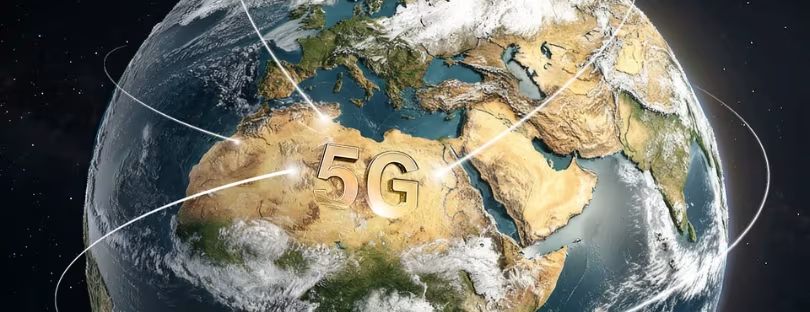
North Africa Fast-Tracks 5G: Tunisia and Egypt Lead as Algeria and Morocco Gear Up
After years of anticipation, North Africa is finally stepping into the 5G era—and it’s doing so at speed. Long considered a region where connectivity lagged behind the Gulf states, North Africa is now making rapid progress as governments and operators push to catch up with global peers. Tunisia set the tone with its landmark launch in February 2025, followed by Egypt in June. Algeria and Morocco are preparing to light up their networks before the year is out, making 2025 the defining year for 5G in the region.
The rollout is not just about faster mobile data. 5G is seen as a cornerstone of economic modernization, with the potential to transform industries, enable digital services, and create new opportunities for startups and established businesses alike. From smarter logistics and connected agriculture to immersive entertainment and smart city infrastructure, 5G opens the door to a wave of innovation. For governments, it represents a chance to accelerate digitization strategies; for operators, it’s a battleground for market leadership; and for consumers, it’s the promise of smoother, faster, and more reliable everyday digital experiences.
With Tunisia already seeing speeds above 300 Mbps and Egypt crossing the 100 Mbps threshold, the momentum is clear. As Algeria and Morocco gear up for their own rollouts—each tying 5G adoption to national development programs and major sporting events—the region is on the cusp of a new digital era.
Key Takeaways
- Tunisia and Egypt saw immediate speed gains. Tunisia combined spectrum in the 700 MHz and 3.5 GHz bands, while Egypt allocated 2500 MHz spectrum. At launch, download speeds exceeded 300 Mbps in Tunisia and 100 Mbps in Egypt, though speeds have since moderated as subscriber numbers grew—an expected trend in new rollouts.
- Fixed Wireless Access (FWA) adoption remains limited. Operators introduced FWA plans at fiber-like speeds (30–100 Mbps in Tunisia, entry-level in Egypt) but device costs and pricing parity with fixed broadband reduced consumer uptake.
- Momentum is building in Algeria and Morocco. Both markets are preparing for launches in late 2025. Morocco, in particular, is tying its rollout to major sporting events like AFCON, supported by spectrum allocations and infrastructure joint ventures that should boost coverage and competition.
The Bigger Picture
5G’s promise in North Africa extends beyond faster mobile browsing. It enables smoother video calls, high-quality streaming, and lower-latency navigation, while also fueling broader economic growth. Faster networks lower barriers for businesses, support startups, and encourage innovation in fields like logistics, agriculture, and smart cities. Combined with the right policies, 5G could draw in investors, R&D hubs, and public–private partnerships, strengthening local tech ecosystems.
Tunisia: The First Mover
Tunisia’s February 2025 launch marked a milestone, with all three major operators—Tunisie Télécom, Orange, and Ooredoo—rolling out 5G simultaneously. Each received spectrum in the 700 MHz and 3.5 GHz bands, with options to expand further into 2.6 GHz and, in the future, 26 GHz mmWave for ultra-high-speed use cases.
Operators introduced both mobile broadband and FWA packages, though pricing made FWA less compelling than fiber or VDSL alternatives. Still, Tunisia’s mobile experience surged: median download speeds surpassed 300 Mbps at launch, latency dropped below 12 ms, and Speedtest Global Index ranked Tunisia as North Africa’s fastest market, overtaking Morocco.
As adoption grew, speeds fell slightly—from 237 Mbps in February to 200 Mbps in June 2025—but performance remained far above pre-5G levels.
Egypt: North Africa’s Largest Market Joins
Egypt, home to over 116 million mobile subscriptions, launched 5G in June 2025 after issuing long-term licenses to all four operators. The rollout began in Cairo, Alexandria, and Upper Egypt, using 2500 MHz spectrum. Unlike Tunisia, Egyptian operators didn’t create new 5G-specific tariffs, instead opting for promotions such as free activation and bonus data.
Performance gains were clear: median download speeds more than doubled to 82 Mbps, with 5G speeds exceeding 100 Mbps in the first week. Upload speeds also improved, though both metrics dipped as networks absorbed more users. Even so, Egypt climbed 17 places in the Speedtest Global Index by mid-2025, closing in on Tunisia and Morocco.
 Algeria: Preparing for Takeoff
Algeria: Preparing for Takeoff
Algeria awarded its first 5G licenses in July 2025 and will begin commercial rollout in eight pilot provinces before expanding nationwide. The government sees 5G as a driver for digitization, with consumer adoption expected to follow quickly since 60–70% of Algerian smartphones are already 5G-capable.
Morocco: 5G Meets AFCON
Morocco finalized its license awards in July 2025, with Maroc Telecom, Orange, and inwi committing to cover nearly half the population by 2026 and 85% by 2030. The rollout aligns with major events like AFCON 2025 and the 2030 FIFA World Cup. Infrastructure joint ventures—TowerCo for 5G towers and FiberCo for broadband expansion—underscore Morocco’s push to accelerate adoption.
Outlook
While North Africa came later to 5G than the Gulf, the region is now catching up quickly. Tunisia and Egypt have shown how much faster speeds can reshape user experiences, though affordability and spectrum strategy will determine how widely 5G is adopted. With Algeria and Morocco entering the race, 2025 is shaping up as the year 5G truly takes root across the region—unlocking new opportunities for users, businesses, and digital economies.






 Algeria: Preparing for Takeoff
Algeria: Preparing for Takeoff



